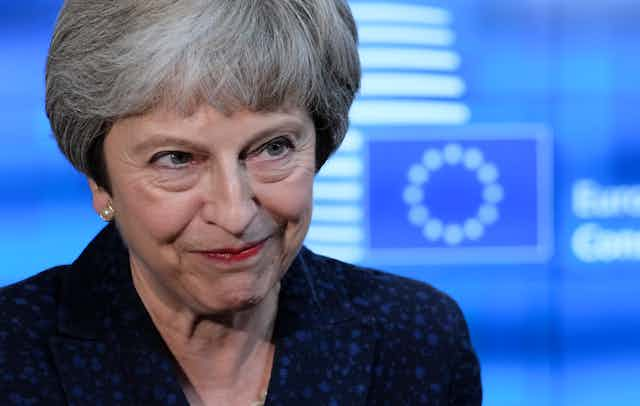The direction of political travel for Theresa May in recent weeks has followed a strange pattern. The more opposition emerges in the UK to her withdrawal agreement with the EU, the more she digs in and claims that the deal is everything to all people. In her press conference following the extraordinary Brussels summit to sign the deal, she told us repeatedly that the deal was in the national interest (six times) and that the deal delivers on everything she has promised as PM (seven times).
One could be forgiven for thinking this is straight out of the Donald Trump playbook. May bamboozles her audience and makes claims so grand and with such solemnity, that we are left dazzled by the glaring inconsistencies in her position. Before there’s time for them to be properly examined, they have become headlines in the newspapers and rolling banners on news channels.
Perhaps the most unsettling mantra to be repeated during May’s press conference was the suggestion that the deal being signed was “what the British people want”. Such a grand claim, backed up by the seeming weight of the 17m strong Leave vote, means we freeze on contact with it. She must be right, right?
However, this freeze comes from another place too: with just as much force as the seeming solidity of her position, we are struck by something else: no matter where you stand on Brexit, you actually know, on a molecular level, that this statement is wrong. And though the grounds for this are well trodden, in the face of the continual repetition of an erroneous position by the PM, it’s worth repeating some truisms.
The first is the most obvious: there were, and likely still are, 16m British people who categorically do not want this deal, and moreover, do not want Brexit at all. There is no point in calling them losers or remoaners, no point in imploring them to move on or asking them to come together. May’s mantra is entirely inaccurate for this group.
Much polling since the referendum has also shown that there has been a significant swing towards remain. So it’s entirely reasonable to suggest there may be many more that 16m British people who now do not want this deal.

A second and much more problematic response to May’s mantra is this: if the Brexiteer MPs in her own party are in any way representatives of the people they helped lead to that 2016 vote, then there is also a huge swathe of British people who also don’t want this deal, albeit for dramatically different reasons than those who now want to Remain. Sure, they want Brexit still, but they want a very different Brexit to this.
Testing the will of the people
There’s a third factor too: if May really believes this is what the British people want, there is one thing she should fear less than anything else: a second referendum. That is to say, if the PM really believes that this is what the British people want, then she should have no opposition to asking them again. She claims that with two and a half years’ experience and millions upon millions of words about Brexit under our belts, this is still what the British people want. OK, then let’s ask them.
There is a further point that makes this jar all the more: the logic underpinning a second referendum – a logic the PM denies repeatedly – is the very same logic that May herself used in calling the snap election of 2017. The people had very clearly spoken two years earlier, in 2015, delivering a 25-seat majority to the Conservatives. Yet, on the basis that things had changed so significantly since the referendum of 2016 , May insisted that we ask the people again for a renewed mandate, just two short years later. If this logic worked then, why not now?
And of course, underpinning all of the above is a more subtle concern, yet one so crucial in politics: nobody has any real confidence in the prime minister – no journalist, no politician, no public. We cannot escape the fact that when she called that snap election, she got it so badly wrong. Her political radar is way off, and no matter the strategy she adopts, we all know it, and we cannot shake it. Therefore not only is her mantra of delivering what the people want so glaringly flawed, it also a mantra we know to be in a repeatedly unsafe pair of hands.
All of this leaves great uncertainty in British politics, and not just in the usual ways a crisis like this does: constitutionally or electorally. Rather, the uncertainty in this case is also at the level of the national psyche: it is deeply unsettling to see the denial of reality on this scale on behalf of the PM and her team. Moreover, the same pattern repeats elsewhere: the hard Brexiteers, and Jeremy Corbyn and his closest team also deny realities in the same way, albeit on very different issues.
For those of us who are deeply concerned about the long-term effects of this on the UK polity, which should cling to the facts more strongly than ever before, and repeat them in equal measure as the sloganeering of our political class, no matter how obvious they may seem. Irrespective of where the UK ends up after Brexit, the most important thing will be the demand for a more sober and truthful political class in these tumultuous times.

